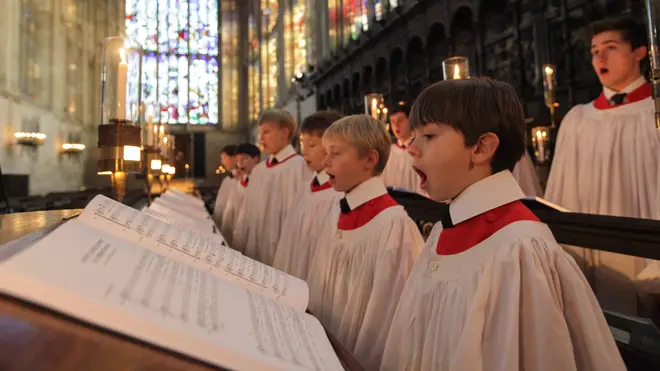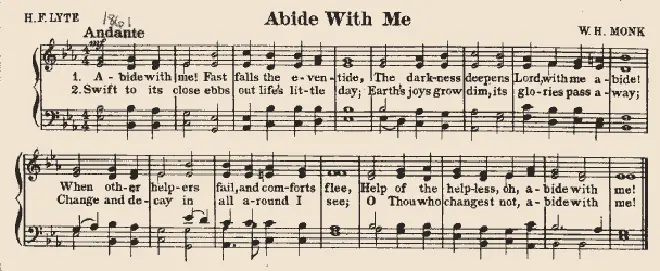On Air Now
Calm Classics with Myleene Klass 10pm - 1am
11 July 2023, 17:50 | Updated: 18 September 2023, 16:28

‘Abide with Me’ by The Choir of Clare College, Cambridge, conducted by Graham Ross
Stirring renditions of the 19th-century hymn ‘Abide with Me’ can be heard across the world, from royal weddings to FA Cup finals. But what are the lyrics and what do they mean?
‘Abide with Me’ is a Christian hymn with origins in Scotland and England, whose lyrics are based on phrases from the Bible.
The opening of the hymn is based on Luke 24:29, “Abide with us: for it is toward evening, and the day is far spent”, while the penultimate verse draws on 1 Corinthians 15:55, “O death, where is thy sting? O grave, where is thy victory?”.
The 19th-century work has had multiple uses, and been adored by kings and politicians alike. Said to be a favourite of King George V, the music was performed at his funeral and was later sung at his granddaughter, Queen Elizabeth II’s, wedding.
Further afield in India, the song also featured in India’s annual Beating Retreat military ceremony from 1950 until 2021, when it was replaced by the patriotic Indian hymn, ‘Ae Mere Watan Ke Logon’.
Here’s all you need to know about the hymn, including its lyrics, composer and history.
Read more: The 15 greatest hymns of all time

The lyrics of ‘Abide with Me’ were written by Scottish minister and poet, Henry Francis Lyte in 1847. According to the traditional story, Lyte wrote the hymn just after conducting his final church service in September 1847; Lyte at the time was suffering from tuberculosis, an infection he would die of two months later.
Another story however, told in the newspaper, The Spectator, 3 October 1925, reports that the hymn was in fact written 27 years earlier than suggested.
The story goes that Lyte wrote the hymn in 1820 after visiting his sick friend, William Augustus Le Hunte. As his friend lay on his deathbed, he repeatedly said the phrase, ‘Abide with Me’. After Le Hunte died, Lyte wrote the hymn based on this phrase and gave the lyrics to the deceased’s family.
While Lyte wrote music to accompany his words – which his biographer described as “a dull tune” – the melody most associated with the hymn was actually written 14 years after the lyrics.
This melody was written by English organist, church musician and music editor, William Henry Monk, and originally titled, Eventide. Monk’s three-year-old daughter had just passed away when he wrote the tune, and she is said to have been his inspiration for the melody.
Eventide was put to Lyte’s lyrics after Monk was appointed the musical editor of Hymns Ancient and Modern, a collection of 273 hymns published in the 1860s. The volume containing the new ‘Abide with Me’ became one of the best-selling hymn books ever produced.
Read more: What are the lyrics to ‘Jerusalem’ and who wrote the famous hymn?

Alongside weddings, funerals, coronations and and military ceremonies, ‘Abide with Me’ can also be heard at football fields and rugby stadiums.
The hymn has been sung at every FA Cup Final since 1927, when it replaced ‘Alexander’s Ragtime Band’, and prior to the kick-off at every Rugby League Challenge Cup Final since 1929.
It was chosen by the then-secretary of the FA, Sir Alfred Wall, and had the approval of George V.

Sing along with The King's Singers: Abide with me
Abide with me, fast falls the eventide
The darkness deepens Lord, with me abide
When other helpers fail and comforts flee
Help of the helpless, oh, abide with me
Swift to its close ebbs out life's little day
Earth's joys grow dim, its glories pass away
Change and decay in all around I see
O Thou who changest not, abide with me
I fear no foe, with Thee at hand to bless
Ills have no weight, and tears no bitterness
Where is death's sting?
Where, grave, thy victory?
I triumph still, if Thou abide with me
Hold Thou Thy cross before my closing eyes
Shine through the gloom and point me to the skies
Heaven's morning breaks, and earth's vain shadows flee
In life, in death, o Lord, abide with me
Abide with me, abide with me